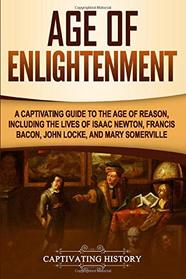This book makes a valuable point that the European Renaissance began in the 1300s; the Scientific Revolution occurred in the 1500s and the Age of Enlightenment evolved in the 1700s. It also states that as science became more important, it shook the ground around religion, particularly the Catholic Church. The author indicates that the Age of Reason (Enlightenment's other title) came to fruition in the new constitutions of both the Americans and the French.
The authors have taken the time to give some biographical sketches of some of the more-popular (Rene' Descartes and Francis Bacon, for example) and less well-known practitioners of philosophical inquiry. I knew that philosophers and scientists and hobbyists had informal writing connections with each other. I was not aware of the "Republic of Letters" or (the women's version called) "Famille d'Alliance." These were formal writing 'round robins' that people shared their ideas and study pursuits. The person highlighted that bowled me over, however, was Anna Maria van Schurman. She was the first woman of the Netherlands (and probably Europe) to earn a college degree. She was a polyglot, a polymath and earned a law degree. I am in awe of her learning and how she used her intelligence. Don't miss chapter 7.
Until reading this book, I did not know that Franklin was an extremely wealthy man by the time of the American Revolution. The American Enlightenment occurred because those Republic of Letters found their way across the ocean to people like Thomas Jefferson, Benjamin Franklin, and Thomas Paine. As the French continued to starve, freeze and be unable to care for themselves, the idea of governance by the people began to make more sense to people like Voltaire.
This book is great because it shows how different thinkers affected the whole of France, England, and the New World. We still see evidence of their teachings in our institutions and attitudes about scientific endeavors, religious tolerance, and separation of church and state. This is a highly readable treatise on the Age of Enlightenment.
The authors have taken the time to give some biographical sketches of some of the more-popular (Rene' Descartes and Francis Bacon, for example) and less well-known practitioners of philosophical inquiry. I knew that philosophers and scientists and hobbyists had informal writing connections with each other. I was not aware of the "Republic of Letters" or (the women's version called) "Famille d'Alliance." These were formal writing 'round robins' that people shared their ideas and study pursuits. The person highlighted that bowled me over, however, was Anna Maria van Schurman. She was the first woman of the Netherlands (and probably Europe) to earn a college degree. She was a polyglot, a polymath and earned a law degree. I am in awe of her learning and how she used her intelligence. Don't miss chapter 7.
Until reading this book, I did not know that Franklin was an extremely wealthy man by the time of the American Revolution. The American Enlightenment occurred because those Republic of Letters found their way across the ocean to people like Thomas Jefferson, Benjamin Franklin, and Thomas Paine. As the French continued to starve, freeze and be unable to care for themselves, the idea of governance by the people began to make more sense to people like Voltaire.
This book is great because it shows how different thinkers affected the whole of France, England, and the New World. We still see evidence of their teachings in our institutions and attitudes about scientific endeavors, religious tolerance, and separation of church and state. This is a highly readable treatise on the Age of Enlightenment.




